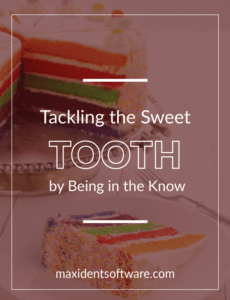
We all crave something sweet at work, especially if the stress is high and our day goes from bad to worse, or even just when we need that certain pick-me-up in the afternoon that can come from something sweet.
But how much do you really know about those cravings for sweets? Are you aware of just how much sugar you are consuming on average in a day versus how much you should be consuming? Do you know what to look for in the list of ingredients? Before you take that slice of cake or that second cookie, let me attack those cravings with something even more powerful– knowledge.
The more you know about the sugars you’re consuming, including the pseudonyms they hide behind, the more effectively you will be able to tackle your sweet tooth head on.
According to research and well, experience, it is clear our brains are genetically programmed to love sweets, which makes it more difficult to say no to them in the office.
Difficult but not impossible. I’m not saying cut out all sweets from your diet. That is unfair to you and your sweet tooth, but the more knowledge you have about sugar, the more you can regulate your sugar intake, which is why in this post, I’m going to provide you with a list of naughty pseudonyms companies use to mask the word “sugar” in the list of ingredients, highlight the negative effects of added sugar in sweets and focusing on the most familiar ones: fructose and sucrose, and share my experiences and the side effects of stopping my added sugar intake cold turkey for only one month.
Hidden Sugars and where to find them
These are sugars that shouldn’t be there but are. It feels like we are given no reprieve from sugar as it seems to be found everywhere, in everything we eat and everything we drink. However, I should note that not all sugar is bad. In a video lecture on sugar titled, The Bitter Truth, Robert H. Lustig, M.D, discusses the crucial differences between glucose and fructose/sucrose. He calls glucose the “energy of life” while fructose/sucrose he labels as “toxic.” Here are just a few of the effects caused by fructose/sucrose:
- Does not suppress the hunger hormone
- Does not stimulate insulin, so leptin doesn’t go up and you eat more.
- Causes metabolic syndrome
- Is metabolised as fat
- Fructose changes the way your brain functions in negative ways, making your brain think you’re starving.
- Acts like alcohol without the buzz
Some of the more familiar products you wouldn’t expect to contain sugar, but in some cases, it is hiding there, too. So if you want to stay vigilant about the amount of sugar and the types of sugar you put into your body, here, here are just a few keywords to look for the next time you’re out grocery shopping.
Common names for added sugar:
Anhydrous dextrose, brown sugar, cane crystals, cane sugar, corn sweetener, corn syrup, corn syrup solids, crystal dextrose, evaporated cane juice, fructose sweetener, fruit juice concentrates, high-fructose corn syrup, honey, liquid fructose, malt syrup, maple syrup, molasses, pancake syrup, raw sugar, sugar, syrup and white sugar, fructose, lactose and maltose.
Uncommon names for added sugar:
carbitol, concentrated fruit juice, corn sweetener, diglycerides, disaccharides, evaporated cane juice, erythritol, Florida crystals, fructooligosaccharides, galactose, glucitol, glucoamine, hexitol, inversol, isomalt, maltodextrin, malted barley, malts, mannitol, nectars, pentose, raisin syrup, ribose rice syrup, rice malt, rice syrup solids, sorbitol, sorghum, sucanat, sucanet, xylitol and zylose.
How much is too much?
The amount of sugar Canadians consume in one year is 88 lbs. If that sounds like a lot, you’re right, it is. In fact, it’s too much for our bodies to handle properly. In reality, we are only supposed to be consuming 25 grams or 6 teaspoons a day, or 20 lbs a year. In total, we are eating 77% more sugar than our bodies can handle, which is actually the cause of weight gain, heart problems, diabetes, and liver problems. So why do we keep eating it?
Why, when we know it’s bad for us can we not just walk away from those treats on the lunch table in the office?
Harmless Additive or harmful and addictive?
I have been a sugar fiend my entire life. At a young age, I’d down an entire case of Vanilla Coke or Pepsi in one twenty-four hour period. To break down the numbers, I was consuming a total of almost 300 grams of sugar a day or approximately just over one cup. Not to mention the caffeine kick I was always on.
I never understood why I just kept drinking the stuff. Why couldn’t I stop? I learned why much later; sugar is addictive. I, however, didn’t realize how addictive until I went off it cold turkey January 2nd of this year. Oh sure, I had read all the articles and had seen all the videos about sugar addiction, but nothing is more powerful a validator than first-hand experience.
Only a month – January 2nd to February 2nd – and I felt the immensely strong grip sugar had on me. At the beginning, avoiding sugary snacks and pop was fairly easy. I felt the cravings every once in awhile, but I was not overpowered by them. As I progressed into the second week, that all changed.
The cravings were getting worse, even my brain was conjuring up images of anything sweet. I was supposed to be joined by two colleagues in the office, but they checked out immediately following the first week. I couldn’t blame them.
I kept thinking about grabbing a snack or a pop every few minutes, but I held my ground. Again, this was only a month. I learned that my sweet tooth was actually my addiction talking just as when a smoker needs a cigarette or an alcoholic needs a drink. That urge for something sweet was my craving on high.

By the third week, the cravings weren’t just powerful but physically painful. And what was worse– one of my colleagues brought in tasty treats made by her baker husband almost every day. These delectable, usually chocolate, treats are normally something I can’t say no to. At this point, I was starting to count the days off one-by-one.
Only ten more days . . . only 6 more days . . . only 3 more days . . . I didn’t want to back down, but I also couldn’t stand how I was feeling, how no matter what I did, I couldn’t stop thinking about having something sweet.
The end of the month came slowly, lagging behind January with its heels dug in. At least that’s how those last few days of January felt. I’ll be honest. I barely made it to the finish line. It wasn’t a pleasant experience, either; but it was an eye-opening one.
This might sound unreal to you, but I guarantee it isn’t. And even though I don’t recommend you stop cold turkey, I do recommend finding a way to cut down slowly if only to cope with the effects a lot more easily than I did.
What now?
Oralhealthgroup.com hosted an article published by the Guardian, tackling the workplace ‘cake culture,’ which is contributing to the obesity epidemic and poor oral health” and are now “encouraging companies to swap biscuits for fruit and nuts.” Why? The Faculty of Dental Surgery at the Royal College of Surgeons believes “we need a culture change in offices and other workplaces that encourages healthy eating and helps workers avoid caving into sweet temptations such as cakes, sweets, biscuits.” But it’s more than temptations we are all tackling as I learned the hard way when attempting to quit cold turkey.
Eric Stice, a neuroscientist at Oregon Research Institute concludes from conducting his own research on sugar this almost upsetting conclusion: “Sugar activates your brain in a special way; it’s very reminiscent of drugs like cocaine.” Why does he say this? Because sugar causes dopamine release in the brain. So, next time you question why you are craving chocolate, pop, or anything sweet, remember that this is why.
When to say yes
As has been mentioned earlier in this post, glucose is the energy of life and can replace a lot of foods swimming in that other sugar. Choose fruits and veggies as snacks instead of brownies, cake, or cookies. I’m not saying cut out all those treats from your diet entirely. You deserve to indulge every once in awhile, but maybe, with a little bit more knowledge, it will be easier to say no to office treats more often and yes to a healthier alternative.
How do you feel about the knowledge I’ve provided here? If you’re interested in still more information about sugar and its effects, check out all the resources listed below. If you’ve gone through a similar struggle to mine with sugar, tell us your harrowing story in the comments section below.
Resources
- https://www.youtube.com/watch?v=MepXBJjsNxs
- http://www.prevention.com/food/healthy-eating-tips/10-hidden-sugar-bombs/slide/9
- https://www.theguardian.com/society/2017/jan/03/let-them-eat-nuts-dentists-want-office-cake-culture-to-end-in-2017
- http://www.berkeleywellness.com/healthy-eating/nutrition/article/sugar-making-us-sick
- https://www.washingtonpost.com/lifestyle/wellness/do-you-know-how-much-sugar-is-in-your-ketchup/2015/06/02/9496b77e-fe5f-11e4-833c-a2de05b6b2a4_story.html?utm_term=.9be2eb5132ef
- http://ngm.nationalgeographic.com/2013/08/sugar/cohen-text
- http://www.macleans.ca/society/health/sugar-and-health-how-much-sugar-do-you-eat-in-a-year/
- http://www.macleans.ca/society/health/death-by-sugar-the-biggest-health-crisis-of-our-time/
- http://www.macleans.ca/society/health/sweet-surprises-how-much-sugar-is-in-your-favourite-foods/
- http://healthyeating.sfgate.com/different-words-sugar-food-labels-8373.html
- https://www.theguardian.com/society/2017/jan/03/let-them-eat-nuts-dentists-want-office-cake-culture-to-end-in-2017



